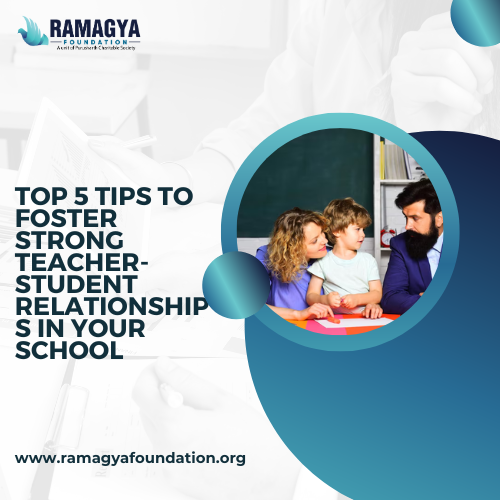The bond between a teacher and a student is unique and precious, often referred to as a mentorship or a guiding relationship. At Ramagya Foundation, we understand the significance of nurturing these connections, especially when working with underprivileged students.
Today, we will explore the top five tips to build better teacher-student relationships in your school, creating a supportive and encouraging environment for pursuing knowledge.
- Active Listening: The Foundation of Trust
Active listening is the cornerstone of any solid teacher-student relationship. It involves hearing the words and understanding the emotions, thoughts, and concerns that lie beneath. By truly listening to students, educators can create an atmosphere of trust and empathy.
As Karl Menninger, a renowned psychiatrist, once said, “Listening is a magnetic and strange thing, a creative force. The friends who listen to us are the ones we move toward. When we are listened to, it creates us, makes us unfold and expand.”
Listening to students, giving them your full attention, and valuing their thoughts and feelings can make a difference in their educational journey.
- Open and Honest Communication: Building Bridges
Effective communication is the bridge that connects teachers and students. Establishing an honest communication where students feel comfortable in sharing their thoughts and concerns is quite essential.
Encouraging students to express themselves, ask questions, and seek clarification fosters a sense of belonging and support in the school community.
- Empathy and Understanding: Walking in Their Shoes
Empathy is the ability to understand and share the feelings of one another. Teachers who practice empathy create an inclusive and supportive learning environment. By putting themselves in a students’ shoes, educators can comprehend students’ challenges and obstacles.
As Angela Maiers, an educator and author, says, “You are a difference maker. You are an awakener. You have the immense power to see the value and potential in every student.”
Empathetic teachers see beyond academic performance and understand each student’s individuality, helping them overcome hurdles and thrive.
- Encouragement and Motivation: Fostering Growth
Teachers play a pivotal role in nurturing students’ self-esteem and confidence. Encouragement and motivation are powerful tools that can inspire students to excel in their academic and personal lives.
By recognizing students’ efforts, highlighting their achievements, and offering constructive feedback, teachers can instill a sense of self-worth and determination in their students.
- Accessibility and Support: Going the Extra Mile
Accessibility is not just about physical presence; it’s about being available and approachable to students. Teachers who go the extra mile to provide support and guidance outside regular classroom hours create lasting connections with their students.
Statistics from a National Center for Education Statistics (NCES) survey show that students who feel they can approach their teachers with questions or concerns are more likely to succeed academically.
Offering additional help, organizing study sessions, or being available for one-on-one discussions can significantly affect students’ academic progress and overall perception of the school.
Building Lasting Connections
In the intricate tapestry of education, teacher-student relationships form the threads that weave together a successful and enriching learning experience. These connections go beyond mere instruction; they transcend traditional roles and labels, creating an environment where trust, respect, and mutual understanding flourish.
Building lasting connections is not just a hallmark of effective teaching; it is a testament to the profound impact educators can have on their students’ lives. The tips outlined here including active listening, open and honest communication, empathy and understanding, encouragement and motivation, and accessibility and support are the building blocks of these connections.
At Ramagya Foundation, we recognize that the underprivileged students we work with may face unique challenges in their educational journey. That’s why we place a particular emphasis on fostering solid teacher-student relationships to bridge gaps, instill confidence, and empower them to overcome obstacles.
These relationships are akin to beacons of guidance and support in the sometimes turbulent education seas. They encourage students to explore their potential, to believe in their abilities, and to embrace their individuality. As educators, we have the privilege and the responsibility to inspire, to awaken the thirst for knowledge, and to provide unwavering support.
In the words of William Arthur Ward, “The mediocre teacher tells. The good teacher explains. The superior teacher demonstrates. The great teacher inspires.” Inspiring students through solid relationships enriches their lives and empowers them to become the best versions of themselves. It equips them to pursue their dreams and positively impact the world.
As we reflect on the top five tips for building better teacher-student relationships, let us remember that the impact of these connections extends far beyond the classroom. They ripple through students’ lives, influencing their choices, shaping their values, and leaving an indelible mark on their journeys. The bonds we nurture today can become the foundation upon which students build their futures, reminding us that the accurate measure of educational success lies in what is learned and the relationships forged along the way.
Read our Article: How NGOs Are Reviving Education System in India
